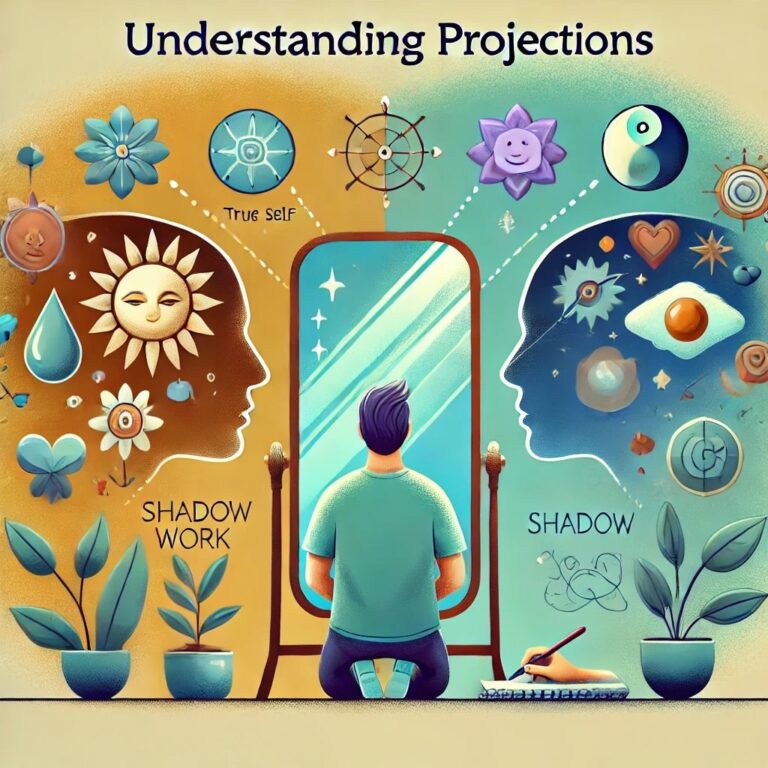How Projections Shape Our Reality
Projections significantly influence how we perceive the world and interact with it. Our internal world, composed of thoughts, beliefs, and emotions, acts as a filter through which we interpret external events. Here are a few ways projections shape our reality:
-
Selective Perception
We tend to notice behaviors in others that align with our projections. For instance, if we are insecure about our competence, we may perceive others as being overly critical or dismissive, even if they are not. Our projections make us more attuned to specific behaviors, reinforcing our beliefs about ourselves and others. -
Self-Fulfilling Prophecies
Our projections can create self-fulfilling prophecies. If we project our fears and insecurities onto others, we may behave in ways that elicit responses confirming our projections. For example, if we believe others are untrustworthy, we may act defensively or suspiciously, causing others to react similarly, thus confirming our belief. -
Relationship Dynamics
Projections heavily influence our relationships. They can lead to misunderstandings and conflicts when we misinterpret others’ intentions based on our projections. For example, if we project our feelings of inadequacy onto a partner, we may accuse them of not appreciating us, even if they do. This can create a cycle of negative interactions and strain the relationship. -
Eyes as Receivers and Projectors
Our eyes are as much receivers as they are projectors. What we see in others is often a reflection of what exists within us. This dual role of our perception organs means that we not only observe the external world but also project our internal world onto it.
The Impact of Projections on Others
Our projections do not only affect us; they also impact those around us in various ways:
-
Miscommunication
Projections can lead to significant miscommunication. When we project our thoughts and feelings onto others, we interpret their actions through the lens of our own biases. This can result in misunderstandings and conflicts, as the other person’s true intentions are overshadowed by our projections. -
Emotional Burden
Being the target of someone’s projections can be emotionally taxing. It can create confusion and frustration as the projected individual may feel unfairly judged or misunderstood. For instance, if someone projects their insecurities onto a friend by constantly accusing them of disloyalty, it can strain the friendship and cause emotional distress. -
Reinforcing Negative Traits
When we project negative traits onto others, we may inadvertently reinforce those traits. For example, if we consistently project our fears onto a colleague by treating them as incompetent, they may begin to doubt their abilities and underperform, thus validating our projection.
Mindfulness: The Key to Managing Projections
Mindfulness is essential in recognizing and managing projections. By staying present and maintaining a clear mind, we can better distinguish between what is true and what is a projection of our inner world. Here are some strategies to help identify and manage projections:
-
Self-Reflection
Regular self-reflection can help us become aware of our projections. By examining our reactions to others and asking ourselves if they reflect our own insecurities or unresolved issues, we can begin to identify patterns of projection. -
Mindfulness Practice
Practicing mindfulness helps us stay present and observe our thoughts and emotions without judgment. This can reduce the likelihood of projecting our internal experiences onto others. -
Seeing the Best in Others
Consciously choosing to see the best in others can counteract the tendency to project negative traits. By focusing on positive qualities, we can foster healthier, more constructive interactions. -
Open Communication
Engaging in open and honest communication with others can help clarify misunderstandings caused by projections. By discussing our perceptions and seeking feedback, we can gain a clearer understanding of others’ intentions and behaviors. -
Therapy
Professional therapy can provide valuable insights into our projections and help us address underlying issues. A therapist can guide us in exploring our unconscious patterns and developing healthier ways of relating to ourselves and others.
Gaining Awareness and Healing Through Shadow Work
Gaining awareness of our projections is a crucial step toward healing. One effective method for this is shadow work, a practice that involves exploring and integrating the hidden parts of ourselves, often referred to as the “shadow.” These are aspects of our personality that we have repressed or denied because they are uncomfortable or socially unacceptable.
Shadow Work
Shadow work, a concept popularized by Carl Jung, involves bringing these hidden aspects to light and understanding how they influence our behavior. By acknowledging and integrating our shadow, we can reduce the need for projection and heal emotional and traumatic baggage.
-
Benefits of Shadow Work
- Self-Awareness: It increases self-awareness, helping us understand the root causes of our projections.
- Emotional Healing: By facing and integrating our shadow, we can heal past traumas and unresolved emotions.
- Authenticity: It allows us to live more authentically, free from the distortions of projection.
- Improved Relationships: With less projection, our interactions with others become more genuine and compassionate.
- Self-Awareness: It increases self-awareness, helping us understand the root causes of our projections.
-
How to Engage in Shadow Work
- Journaling: Write about your triggers and negative reactions. Reflect on what these might reveal about your own unresolved issues.
- Therapy: Work with a therapist skilled in shadow work to explore and integrate your shadow aspects.
- Meditation: Use meditation to observe your thoughts and emotions, allowing hidden aspects to surface.
- Creative Expression: Engage in creative activities like art or writing to express and explore your shadow self.
- Journaling: Write about your triggers and negative reactions. Reflect on what these might reveal about your own unresolved issues.
Moving Toward Authenticity: Recognizing and Reducing Projections
Projections are a powerful psychological mechanism that shapes our reality and influences our relationships. By projecting our thoughts and feelings onto others, we avoid confronting our own flaws, but at the cost of distorting our perception of reality and impacting those around us.
Recognizing and addressing projections is essential for personal growth and authentic, compassionate interactions. By understanding that our eyes are both receivers and projectors, we can cultivate mindfulness, maintain a clear mind, and see the best in others, enabling us to distinguish between truth and projection. Through self-reflection, mindfulness, open communication, therapy, and shadow work, we can reduce the influence of projections and foster healthier, more meaningful relationships.
Embracing the Path to Healing
Gaining awareness of our projections is the path toward healing, allowing us to free ourselves from emotional and traumatic baggage and live more authentically. Embrace the journey of self-discovery, and remember that understanding your projections is a powerful tool for creating a more compassionate and fulfilling life.












